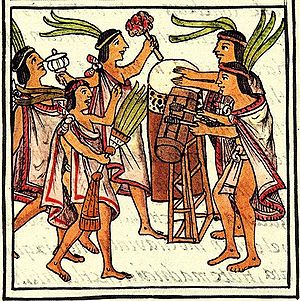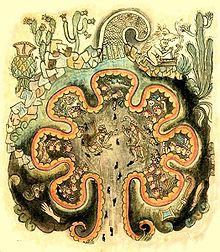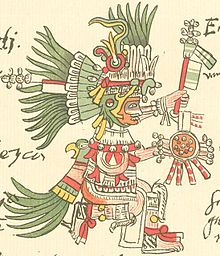- Mexica
-
This article is about the pre-Columbian people. For other uses, see Mexica (disambiguation).
Mexica 
Music and dance during a One Flower ceremony, from the Florentine Codex. Regions with significant populations Tenochtitlan Tlatelolco Languages Religion Aztec religion
Catholicism (after the Conquest)Related ethnic groups Other Nahua peoples
The Mexica (Nahuatl: Mēxihcah, pronounced [meːˈʃiʔkaʔ]; the singular is Mēxihcatl) or Mexicas — called Aztecs in occidental historiography, although this term is not limited to the Mexica — were an indigenous people of the Valley of Mexico, known today as the rulers of the Aztec empire. The Mexica were a Nahua people who founded their two cities Tenochtitlan and Tlatelolco on raised islets in Lake Texcoco around AD 1200. After the rise of the Tenochca Mexica they came to dominate the other Mexica city-state Tlatelolco.
The Mexica are eponymous of the placename Mexico (Mēxihco).[1] This refers to the interconnected settlements in the valley which became the site of what is now Mexico City, which held natural, geographical, and population advantages as the metropolitan center of the region of the future Mexican state, which was expanded upon in the wake of the Spanish conquest and administered from the former Aztec capital as New Spain.
Like many of the peoples around them, the Mexica spoke Nahuatl. The form of Nahuatl used in the 16th century, when it began to be written in the alphabet brought by the Spanish, is known as Classical Nahuatl. Nahuatl is still spoken today by over 1.5 million people.
Notes
- ^ Andrews (2003): p. 500.
The Mexica people consisted of the Olmec, Toltec, and Aztec people. The empire began in 1430 and were conquered and captured by 1521.
References
- Andrews, J. Richard (2003). Introduction to Classical Nahuatl (rev. ed. ed.). Norman: University of Oklahoma Press. ISBN 0-8061-3452-6.
Categories:- Mesoamerican cultures
- Aztec
- Nahuatl words and phrases
Wikimedia Foundation. 2010.


